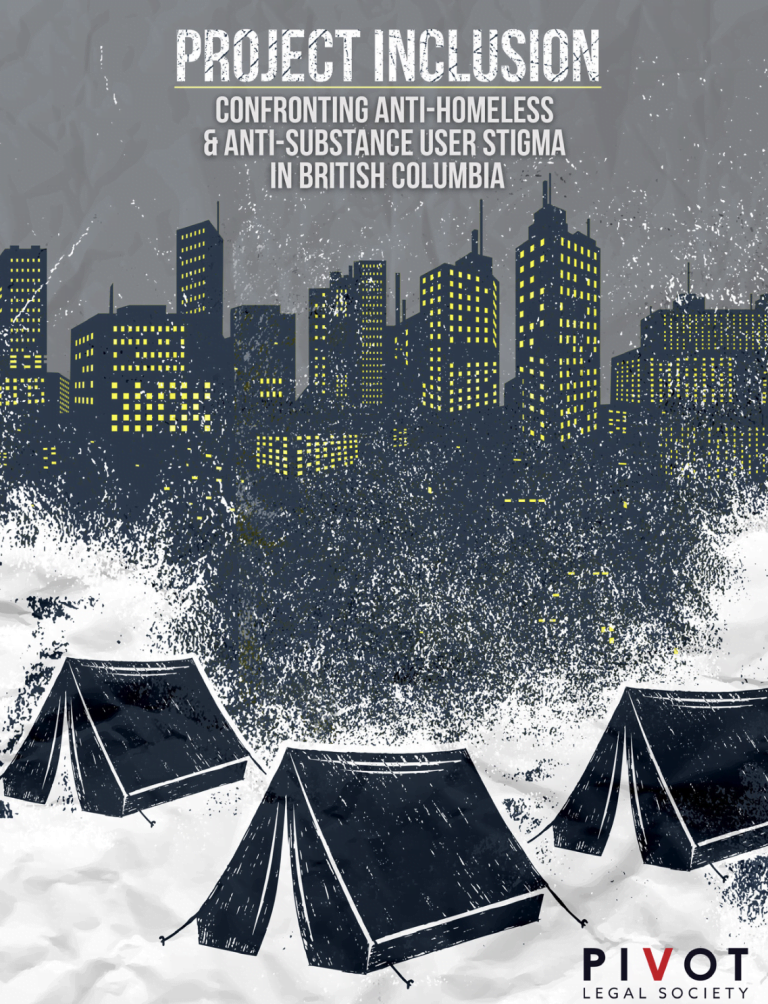13 search results
for
Poverty and economic inequality
The impacts of police and policing
The Director of Police Services must develop the following Provincial Policies for all policing agencies in British Columbia:
Recommendation 7: A Provincial Policy on confiscation of belongings by police which includes:- a strong statement that explains to all police forces the harm caused by the confiscation of homeless people’s belongings;
- deprioritize confiscating homeless people’s belongings, especially necessities of life such as shelter, clothing, medication, and important personal items; and
- a directive to issue receipts for belongings and cash where they must be taken, with instructions for how to get them back.
-
Category and theme:
Groups affected:
The impacts of police and policing
The Director of Police Services must develop the following Provincial Policies for all policing agencies in British Columbia:
Recommendation 8: A Provincial Policy detailing people’s right to privacy in tents and informal living structures akin to the right to privacy in private residences.-
Category and theme:
Groups affected:
The impacts of police and policing
Recommendation 10: The Ministry of Housing and Municipal Affairs (MHMA) must make a province-wide commitment to supporting homeless people to maintain their belongings and to ensuring that homeless people have access to services without fear of losing their possessions. The MHMA must partner with local governments in collaboration with groups of people with lived experience, to train local bylaw officers:- to recognize and respect the belongings of homeless people; and
- to work effectively with people experiencing homelessness to clean up or discard belongings where there is a pressing public safety, access, or environmental need to do so.
-
Category and theme:
Groups affected:
The impacts of police and policing
Recommendation 11: The Ministry of Public Safety and Solicitor General, in partnership with the MHMA, should issue a directive stating that no public funds may be used for private security patrols on public property, including in public parks.-
Category and theme:
Groups affected:
Service gaps and barriers
Recommendation 24: The Ministry of Mental Health and Addictions and the Ministry of Health must improve the ability of BC hospitals to meet the needs of people living with the effects of substance use, mental illness, and/or homelessness by:- auditing experiences in hospitals, beginning with an analysis of people’s experiences where they have been turned away from emergency rooms or discharged and where there have been negative health consequences;
- working with people with lived experience to audit provincial standards for effectively managing substance withdrawal in hospital settings;
- ensuring that all hospitals offer supervised consumption services to patients; and
- working with the Ministry of Municipal Affairs and Housing to create transitional housing options to ensuring that sick and injured people are not released from the hospital to the streets or to emergency shelter.
-
Category and theme:
Audience:
Service gaps and barriers
The Ministry of Social Development and Poverty Reduction must make immediate changes to BC’s Income Assistance and Disability Assistance programs including:
Recommendation 25: Increasing income assistance rates to the Market Basket Measure and indexing them to inflation.-
Category and theme:
Audience:
Groups affected:
Service gaps and barriers
The Ministry of Social Development and Poverty Reduction must make immediate changes to BC’s Income Assistance and Disability Assistance programs including:
Recommendation 26: Reviewing the processes that are currently in place for reporting “welfare fraud” to provide greater accountability and ensure that people receiving income assistance are not denied survival income without due process.-
Category and theme:
Audience:
Groups affected:
Service gaps and barriers
The Ministry of Social Development and Poverty Reduction must make immediate changes to BC’s Income Assistance and Disability Assistance programs including:
Recommendation 27: Increasing access to in-person services for income assistance and disability applicants.-
Category and theme:
Audience:
Groups affected:
Service gaps and barriers
The Ministry of Social Development and Poverty Reduction must make immediate changes to BC’s Income Assistance and Disability Assistance programs including:
Recommendation 28: Ensuring that people living with disabilities can access disability support by:- simplifying the application process to reduce wait times and lessen reliance on advocates;
- providing provincial guidelines for doctors/service providers on how and when to fill out disability forms; and
- ensuring that hospital social workers are resourced and directed to work with patients in need to apply for disability benefits.
-
Category and theme:
Audience:
Groups affected:
Service gaps and barriers
Recommendation 29: The Legal Services Society of BC must provide legal support for appeals where a person has been denied income assistance or disability assistance.-
Category and theme:
Audience:
Groups affected:
